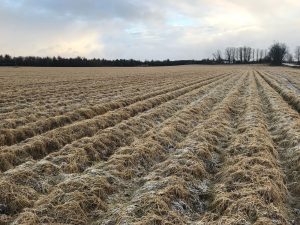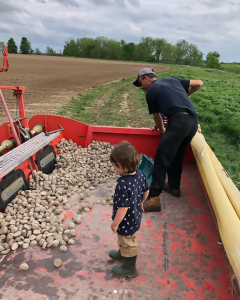HOME PREVIOUS ARTICLE NEXT ARTICLE
By Charlotte Potter, University of Guelph, School of Environmental Design and Rural Development (SEDRD)
From rising fuel prices and inflation to lack of rain and pest-related difficulties, for potato producers of all sizes and production styles across Ontario, the 2022 growing season was filled with challenges. Approaches to solving these problems may have differed between farmers of different sizes, scales, and styles, but within every group, there were innovative individuals championing successful Best Management Practices (BMPs) for potato cultivation.
Interested in understanding who these farmers are, researchers at the University of Guelph in the School of Environmental Design and Rural Development (SEDRD) are conducting a three-year OMAFRA-funded study. The study aims to understand what factors led to the farmers’ use and adoption of the successful approaches, and what support farmers need to promote the uptake of these diverse and innovative practices on a wider scale across the sector.
BMPs take place all along the value chain, from seed supply to soil and water management, cultivation and harvest practices, and storage and transport. Farmers of different sizes (large, medium, small-scale) and styles (conventional, organic, ecological) will have different approaches based on their access to resources—including money, land, and access to knowledge about the different innovative practices other people are using. While innovative farmers of all sizes and scales exist who have sustainable solutions to address challenges in the sector, knowledge created within groups tends to be siloed and doesn’t get shared with farmers of different styles. So, while there are important lessons to be learned from all these production styles, it’s not easy for producers to connect outside of their groups, which limits the possibility to share and scale sustainable, cost-effective solutions to address ongoing agricultural challenges.
The team at the University of Guelph wanted to start a conversation to build bridges for knowledge sharing with farmers, students, researchers, policymakers, and community members to try to understand 1) what farmers of different sizes and styles can learn from each other; 2) why this kind of learning might not be happening; and 3) to discuss ways to bridge these gaps and create collaborative relationships between innovative farmers.
With this goal in mind, SEDRD hosted an event in early February featuring presentations by three Ontario potato farmers—each with their own unique approach and outlook on sustainable potato production: Dr. Peter VanderZaag, Isaiah Swidersky, and Ken Laing. After the presentations, a panel discussion was hosted by Vanessa Currie, University of Guelph Plant Agriculture Research Technician, and Jean-Charles Le Vallée, country representative for the Inter-American Institute for Agricultural Co-operation (IICA).
Summary of panel discussion: speakers
Dr. Peter VanderZaag has owned and operated Sunrise Potato Farms since 1991. He is a large-scale producer and breeder selling seeds in Canada, the USA, and parts of Asia including China. Peter manages roughly 5,500 acres of farmland near Alliston Ontario, mostly selling his potatoes wholesale for chip production. Peter’s farm management style is informed by his PhD in Tropical Agriculture and his 10+ years working for the International Potato Center in Africa, Asia, and Bangladesh. Peter’s approach is intensive but sustainably oriented; as a scientist, he applies an experimental method to his operation, breeding new, heartier, and tougher varieties of potatoes, and trialing them in his fields. Testing different combinations to minimize tillage such as cover crops and crop rotations on different segments of his land, Peter is constantly adapting and looking to decrease food loss, increase soil health, and reduce his overall ecological impact. By recognizing the relationships between his in-field management and the processing and commercialization of his crops, Peter’s holistic approach carefully balances the needs and requirements of his buyers and the industry with the goals and principles of soil health and sustainability. For more information on Sunrise Potato Farm visit: https://www.sunrisepotato.com/ or https:// sunrisepsi.com/who-we-are
Isaiah Swidersky is the owner/operator of Wider Sky Farms (https://www.facebook.com/widerskyfarms/), and one of the largest organic potato producers in the region. He operates 500 acres of land with 200 acres devoted to potatoes. As a University of Guelph graduate and certified organic producer, he relies on cover crops and a 6-year crop rotation to manage weeds and ensure the health and quality of his soil. Using compost, organic manure, and the power of the sun, Isaiah’s production style seeks to maintain and steward the health of the ecosystem, his family, and his community. As an organic farmer, he acknowledges that there are trade-offs and challenges to organic production, and while he strives to work in harmony with nature, farming does come with a shift and a disturbance in soil and environment. “Organic may not be the best fit, but it allows me to be a farmer while also caring for the environment in a fitting way”.
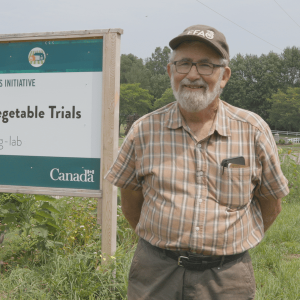
Ken Laing, one of the Living Lab-Ontario farm cooperators (Ecological Farmers Association of Ontario (EFAO))
Ken Laing owns and operates Orchard Hill Farms with his wife Martha and daughter Ellen. Situated just outside of London, Ken’s operation is much smaller than Peter and Isaiah’s, at just seven acres. Ken graduated from the University of Guelph in 1979 with a degree in Horticulture and started farming on a piece of his wife’s family farm. Purchasing a team of horses in 1980 which operate as the main source of power on his field, Ken and Martha began operating an organic and Community Supported Agriculture (CSA) model. Over the last three years, Ken has been a farm cooperator in the Living Lab – Ontario project to trial a no-till method of potato production where he controls weeds and supports soil health by leaving his cover crop standing all year round. Like so many farming practices, timing is extremely important and can be a tricky element to get right. Rolling his cover crop, Ken creates a mulch on the ground through which potatoes emerge, providing weed control throughout the entire season. These are just small test plots, but Ken hopes to inspire growers to apply the methods to a larger scale.
Healthy soil, environmental sustainability, and economic viability are critical regardless of size, scale, or scope of production or market being served. While each approach comes with trade-offs, benefits, and challenges in all of these three areas, the unique contexts and circumstances of these distinct farmers creates fertile ground for the testing and trialing of diverse approaches—which may be inaccessible to the others but can have benefits for each of them. As changing climate realities and rising costs of production put pressure on farmers throughout the sector, potato producers are reminded of the constant need for ongoing improvement and innovation. Regardless of size, small changes can have substantial results both at the farm level by improving soil health or driving down costs, and at the watershed level when producers join together to address challenges on a community scale.
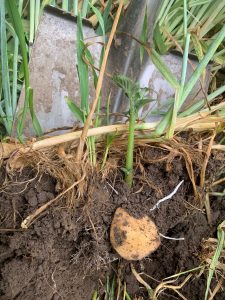
The development of a potato seed at time of mowing (Ecological Farmers Association of Ontario (EFAO)).
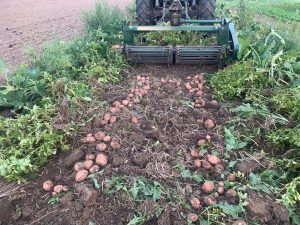
Digging potatoes from early planted plot on August 30th (Ecological Farmers Association of Ontario (EFAO)).
In a province with high land prices and production costs, the panel acknowledged and points out that for many farmers with thin margins, it can be difficult to share information with your neighbours because everyone is competing for land and for market access. “Farmers like to rubberneck” Peter remarked, “You don’t ask what your neighbours are doing, you just kind of take a look when you drive past”.
So how do we begin to build bridges and start talking, sharing, and learning from each other? Sharing and discussion through forums such as this can provide a necessary first step for building understanding and learning from the years of trial and error (and wins and losses) of others. Helping to share innovations between producers to make the sector healthier, more sustainable, and economically strong. They also point out that participation in organizations can help people build bridges. Ken tells us that being part of organizations such as Ontario Soil Network (OSN), is a way for him to learn from others in a meaningful way. By bringing together farmers from across the province who have different styles, approaches, and ideas about farming, local farmers’ associations, and members groups can be incredible resources for learning from and within the community. Beneficial associations from around the province include the Ontario Soil and Crop Improvement Association (OSCIA), the Ecological Farmers’ Association of Ontario (EFAO), the Ontario Seed Potato Growers Association (OSPGA) and the Ontario Potato Board (OPB). Local events, field days, and demonstrations spread farmer-led knowledge to help people adapt, but more than that, they also help to build community, relationships and bridges between individuals who might never otherwise interact.
“When I consider the operations that we’re all running, they may look different, but we’re all united in having the same ideals,” according to Isaiah. “We consider ourselves stewards of the land, going about farming in different ways, and as long as we can get past the competitive nature of this business and be open with each other about how we’re doing things, hopefully we can come together to be less divided.”
While there is still a long way to go to address the environmental, economic, and social challenges that come with farming in this province, it’s clear that within every segment of this sector, there are people who are doing things differently. By having more conversations like these, we hope to facilitate more learning, sharing, and bridge-building.
If you grow potatoes and want to get in touch or share your experiences, reach out to Charlotte Potter (potterc@ uoguelph.ca) or Silvia Sarapura (sarapura@uoguelph.ca) and join the conversation—we would love to hear from you!
